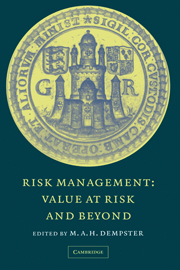Book contents
- Frontmatter
- Contents
- Contributors
- Introduction
- 1 Quantifying the Risks of Trading
- 2 Value at Risk Analysis of a Leveraged Swap
- 3 Stress Testing in a Value at Risk Framework
- 4 Dynamic Portfolio Replication Using Stochastic Programming
- 5 Credit and Interest Rate Risk
- 6 Coherent Measures of Risk
- 7 Correlation and Dependence in Risk Management: Properties and Pitfalls
- 8 Measuring Risk with Extreme Value Theory
- 9 Extremes in Operational Risk Management
9 - Extremes in Operational Risk Management
Published online by Cambridge University Press: 25 January 2010
- Frontmatter
- Contents
- Contributors
- Introduction
- 1 Quantifying the Risks of Trading
- 2 Value at Risk Analysis of a Leveraged Swap
- 3 Stress Testing in a Value at Risk Framework
- 4 Dynamic Portfolio Replication Using Stochastic Programming
- 5 Credit and Interest Rate Risk
- 6 Coherent Measures of Risk
- 7 Correlation and Dependence in Risk Management: Properties and Pitfalls
- 8 Measuring Risk with Extreme Value Theory
- 9 Extremes in Operational Risk Management
Summary
Abstract
Operational risk is defined as a consequence of critical contingencies, most of which are quantitative in nature, and many questions regarding economic capital allocation for operational risk continue to be open. Existing quantitative models that compute the value at risk for market and credit risk do not take into account operational risk. They also make various assumptions about ‘normality’ and so exclude extreme and rare events. In this paper we formalize the definition of operational risk and apply extreme value theory for the purpose of calculating the economic capital requirement against unexpected operational losses.
Introduction
Highly publicized events such as those at LTCM, Barings and Sumitomo have all involved mismanagement leading to extraordinary losses and raising concerns about financial instability at international levels. As a result, along with the established capital charges for market and credit risks, the Basle Committee on Banking Supervision is proposing an explicit capital charge to guard the banks against operational risks. The response from the banks has been an increasing number of operational risk management initiatives with corresponding efforts to formulate a framework for capital allocation for operational risk. This paper contains a model for calculating the economic capital against extreme risks which is our contribution to the quantification of operational risk.
- Type
- Chapter
- Information
- Risk ManagementValue at Risk and Beyond, pp. 247 - 274Publisher: Cambridge University PressPrint publication year: 2002
- 14
- Cited by



